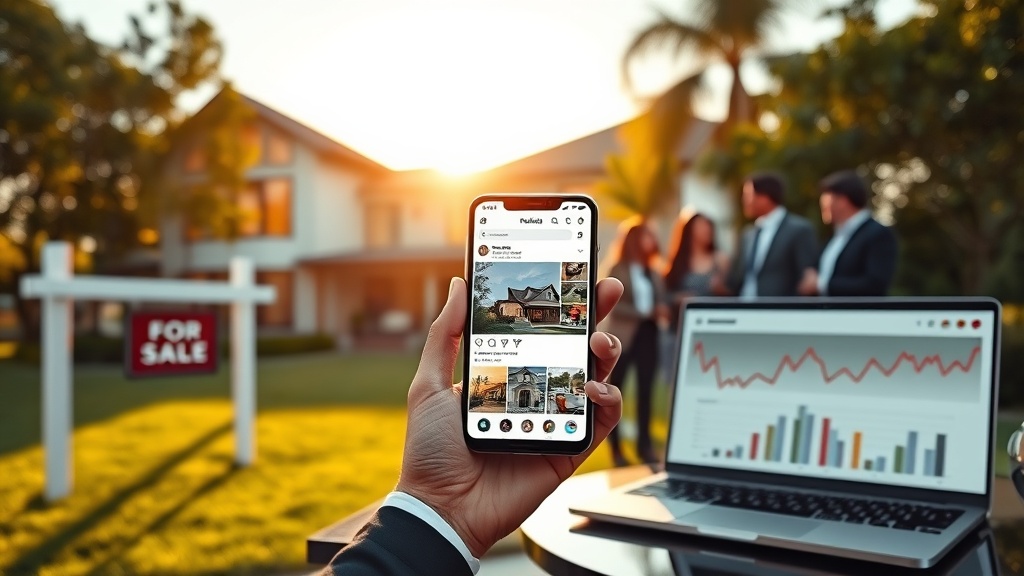The Future of Real Estate Marketing: Embracing Social Media Trends

" "
Hello, dear readers! Today, we're diving into an exciting and ever-evolving world: real estate marketing. Specifically, we'll explore how social media trends are shaping the future of this dynamic industry. Whether you're a seasoned real estate professional or someone curious about the trends that are transforming the market, this blog post will provide you with insightful information and practical scenarios. So, let's get started!
A Glimpse into the Past: Real Estate Marketing Evolution
Before we delve into the future, it's essential to understand where we've come from. Real estate marketing has undergone significant transformations over the decades. Traditionally, it relied heavily on print advertising, word-of-mouth, and local networking. Real estate agents would often rely on newspaper ads, flyers, and open houses to showcase properties.
The Digital Revolution: The advent of the internet in the late 20th century marked a pivotal shift. Websites became the new storefronts, and online listings transformed how buyers and sellers interacted. Platforms like Craigslist and Zillow emerged, offering a broader reach and more information at the click of a button.
The Social Media Wave: As social media platforms gained popularity in the early 21st century, they began to play a crucial role in marketing strategies across industries. Real estate was no exception. Social media allowed for more personal connections, visual storytelling, and direct engagement with potential buyers.
The Current Landscape: Social Media's Role in Real Estate Marketing
In today's world, social media is not just an accessory to real estate marketing; it's a necessity. Let's explore how real estate professionals are leveraging these platforms:
1. Visual Storytelling through Instagram
Instagram is a powerhouse when it comes to visual content. Real estate agents are using it to showcase properties through stunning photographs and engaging videos. The platform's features, like Stories and Reels, offer dynamic ways to highlight a property's best features.
- Scenario: Imagine a real estate agent showcasing a beautiful beachfront property. Through Instagram, they can post a series of images capturing the sunrise view, a virtual tour of the interior, and even a video of nearby attractions. This immersive experience can attract potential buyers from across the globe.
2. Engaging Audiences on Facebook
Facebook remains a dominant force in social media marketing. Its extensive user base and diverse demographics make it an ideal platform for real estate professionals to reach a broad audience.
- Scenario: A real estate agency hosts a virtual open house event on Facebook Live. Prospective buyers can join from anywhere, ask questions in real-time, and get a feel for the property without leaving their homes. This interactive approach not only widens the audience but also builds rapport with potential clients.
3. Professional Networking on LinkedIn
LinkedIn is often overlooked in real estate marketing, but it offers unique opportunities for professionals to connect, share insights, and establish authority in the industry.
- Scenario: A real estate professional writes articles on LinkedIn about market trends, investment opportunities, and home-buying tips. By positioning themselves as an industry expert, they attract potential buyers and collaborators who value their expertise.
4. Targeted Advertising with Facebook Ads
Targeted advertising is a game-changer in real estate marketing. Facebook Ads allow agents to reach specific demographics based on location, interests, and online behavior.
- Scenario: A real estate agency runs a Facebook Ad campaign targeting young families looking for homes in suburban areas. By tailoring their ads to this specific audience, they increase the likelihood of attracting serious buyers.
5. Virtual Tours on YouTube
YouTube is an excellent platform for offering in-depth property tours. With video content, real estate professionals can guide viewers through a property, providing a sense of scale and ambiance that photos alone can't convey.
- Scenario: A real estate agent creates a YouTube channel featuring virtual tours of available properties. These videos not only showcase homes but also highlight local neighborhoods, schools, and amenities, providing valuable context for potential buyers.
Future Trends: What's Next for Real Estate Marketing?
The real estate marketing landscape continues to evolve, driven by technological advancements and changing consumer behavior. Here are some trends that are likely to shape the future:
1. Augmented Reality (AR) and Virtual Reality (VR)
AR and VR are poised to revolutionize how properties are marketed and viewed. These technologies offer immersive experiences that allow potential buyers to explore properties from the comfort of their own homes.
- Future Scenario: Imagine a prospective buyer using a VR headset to walk through a property thousands of miles away. They can explore each room, visualize furniture placement, and get a feel for the space as if they were physically there.
2. Artificial Intelligence (AI) for Personalization
AI is becoming increasingly sophisticated in tailoring marketing efforts to individual preferences. In real estate, this could mean personalized property recommendations and communication.
- Future Scenario: An AI-driven chatbot on a real estate website interacts with users, asking questions about their preferences and budget. It then provides a curated list of properties that match their criteria, streamlining the search process.
3. Sustainable and Smart Homes
As environmental concerns grow, so does the demand for sustainable and smart homes. Real estate marketing will need to adapt by highlighting eco-friendly features and smart technology integration.
- Future Scenario: A real estate agency promotes a new development of energy-efficient homes on social media, emphasizing solar panels, smart thermostats, and sustainable building materials. This focus on sustainability attracts environmentally conscious buyers.
4. Influencer Collaborations
Influencer marketing is gaining traction in real estate. Collaborating with social media influencers can amplify a property's visibility and credibility.
- Future Scenario: A real estate agent partners with a popular home design influencer to showcase a property. The influencer shares their experience with their followers, reaching a broader audience and generating interest in the property.
Balancing Tradition and Innovation
While social media and technology are driving the future of real estate marketing, it's essential to strike a balance between innovation and traditional methods. Personal connections, exceptional customer service, and local expertise remain invaluable.
The Human Touch
Despite technological advancements, real estate is inherently a people-centric industry. Buyers and sellers value the expertise and guidance of professionals who understand their needs and preferences.
- Scenario: A real estate agent combines their social media efforts with in-person consultations, offering personalized advice and building lasting relationships with clients. This approach fosters trust and enhances the overall experience.
Local Expertise
While social media extends the reach of marketing efforts, local expertise is crucial for understanding market nuances and trends.
- Scenario: A real estate agency uses social media to reach potential buyers but emphasizes their deep knowledge of the local market in their content. They provide insights into neighborhood developments, school districts, and community amenities, adding value to their online presence.
Conclusion: Embracing the Future
The future of real estate marketing lies in embracing social media trends and technological innovations while maintaining the core values of the industry. By leveraging platforms like Instagram, Facebook, LinkedIn, and YouTube, real estate professionals can connect with a global audience and provide immersive experiences that traditional methods can't match.
As we look ahead, augmented reality, artificial intelligence, and sustainable living will play a pivotal role in shaping the industry. However, the human touch, local expertise, and exceptional customer service will remain integral to building lasting relationships and achieving success.
So, whether you're a real estate agent, a buyer, or simply someone interested in the ever-evolving world of real estate, staying informed and adaptable is key. Embrace the trends, harness the power of technology, and keep the human element at the heart of your endeavors.
Thank you for joining me on this journey into the future of real estate marketing. Until next time, happy house hunting and marketing!











